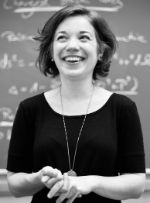Trial lecture - time and place
Trial lecture: December 20 at 10:15 in Lille Fysiske auditorium, Fysikkbygningen
Conferral summary / Kreeringssammendrag
Relativt modern fysikkundervisning
Einsteins relativitetsteori representerer den moderne beskrivelsen av verden og har erstattet Newtons beskrivelse i fysikkens forskningsmiljøer – men ikke helt i skolekonteksten. I sitt PhD-prosjekt har Magdalena Kersting utviklet innovative og nettbaserte læringsressurser som gjør det enklere å undervise i generell relativitet. Hennes forskning på elevers begrepsmessige forståelse hjelper å tilrettelege for god undervisning i moderne fysikk og kan motivere elever for videre studier innen fysikk.
Main research findings / Hovedfunn
General Relativity in Schools
According to Albert Einstein, common sense is nothing more than a deposit of prejudices laid down in the mind before the age of eighteen. Even though experiments have repeatedly confirmed Einstein’s ideas about gravity, space, and time, physics education in schools continues to be dominated by a 19th-century point of view. Consequently, the theory of relativity still contradicts the common sense of many. Aiming to make general relativity a part of the intellectual equipment of young learners, this PhD-thesis contributes to the emerging field of Einsteinian Physics education. Proposing a way of turning general relativity into a subject area that can be taught at the secondary school level, this work presents an educational reconstruction of Einstein’s theory of gravity. The research-based development of a digital learning environment set the stage for investigations into students’ learning processes and conceptual challenges in general relativity. Findings show that secondary school students were able to obtain a qualitative understanding of general relativity when working with the digital learning resources that facilitated interactions with peers and teachers. The recent birth of gravitational wave astronomy and the first-ever taken picture of a black hole create a fantastic vision of physics for the future. The findings of this research will help teachers and instructors bring this vision into science classrooms.
